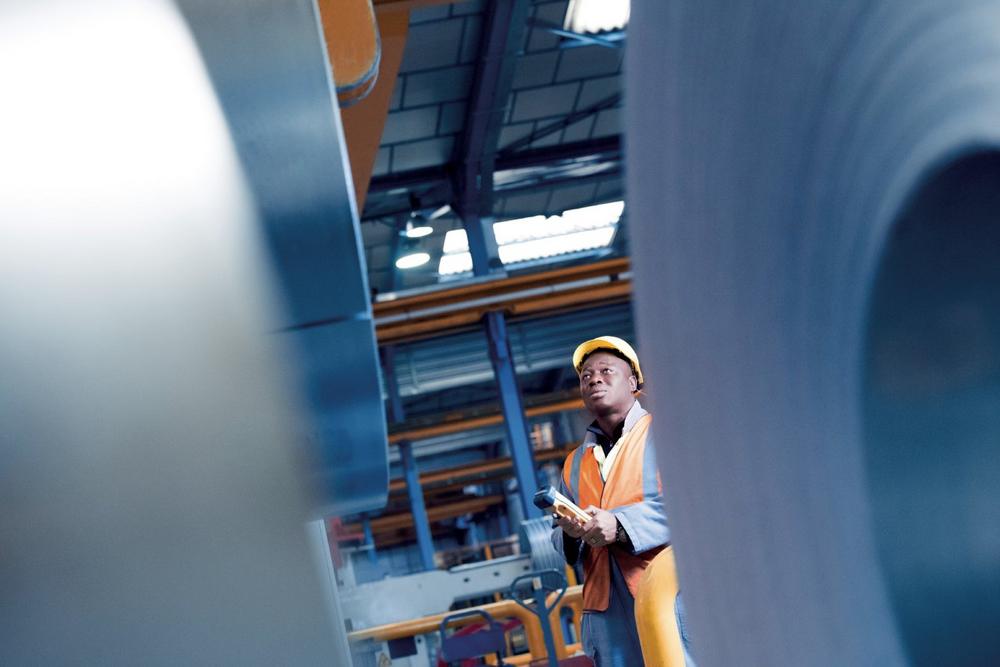Product Carbon Footprint – individual calculation according to recognized standards
The complex calculation of the Product Carbon Footprint incorporates specific data on warehouse locations, delivery and shipment, as well as all supplier and material data. This means that all data along the entire supply chain up to the customer, the so-called "cradle to gate" approach, is taken into account. In accordance with the requirements of the Greenhouse Gas Protocol – the globally recognized standard for measuring greenhouse gas emissions – this data is allocated to the individual order items at thyssenkrupp Materials Services. This allocation is based on the one hand on the extensive process and material knowledge of thyssenkrupp Materials Services and on the other on the support of external experts in assessing the corresponding greenhouse gas effects. In this way it is possible for each item to transparently show all steps from production, delivery, storage and processing to delivery to the customer in terms of greenhouse gas impact.
Frank Thelen, Head of Governance and Procurement at thyssenkrupp Materials Services and largely involved in the development of the model: “With the data from the calculations, our customers have exact baseline data for their own PCF calculations. On this basis, we can advise our customers so that, for example, products from other manufacturing processes with lower CO2e values can be used in the future. In this way we make an important contribution to the climate neutrality of our customers’ products." thyssenkrupp Materials Services’ calculation model has been certified by the international classification society DNV.
Green Steel – less CO2e through renewable energies and intelligent recycling
One of the steel grades in the thyssenkrupp Materials Services product portfolio that customers can use to reduce their Scope 3 emissions will be "green steel" from the Swiss Steel Group from 2023 – the green forged and rolled bright and bar steel is used by thyssenkrupp Aerospace, among others, to build aircraft parts. The manufacturing process for this material is particularly environmentally friendly, with emissions 80 to 95 percent below the industry average.
"Even if it is not yet possible to produce steel in a climate-neutral way, a reduction of 10 or 20 percent is already an important step, particularly for this very CO2e-intensive material," says Frank Thelen. "With the new transparency across our entire supply chain, we can now work with our partners to make it as climate-friendly as possible in the future."
thyssenkrupp Materials Services is the biggest mill-independent materials distributor and service provider in the Western world with around 380 locations – including around 260 warehouse sites – in more than 30 countries. The versatile range of services offered by the materials experts allows customers to focus even more strongly on their individual core businesses. As part of its strategic further development "Materials as a Service" the company is focusing on the supply of raw materials and materials as well as products and services in the area of supply chain management. Digital solutions ensure efficient and resource-saving processes for customers and thus provide the basis for sustainable action. From 2030 Materials Services will operate on a climate-neutral basis.
thyssenkrupp Materials Services GmbH
thyssenkrupp Allee 1
45143 Essen
Telefon: +49 (201) 844-0
http://www.thyssenkrupp-materials-services.com/de
Head of External & Internal Communications
Telefon: +49 (201) 844-534416
E-Mail: lars.bank@thyssenkrupp-materials.com
Spokesperson
Telefon: +49 (201) 844-535721
E-Mail: katharina.nordmeyer@thyssenkrupp-materials.com
![]()
